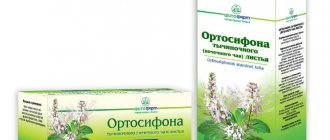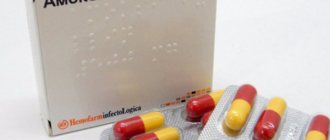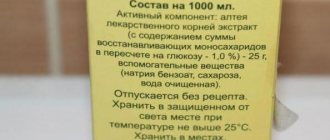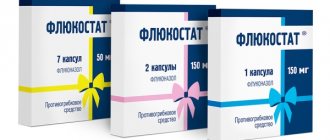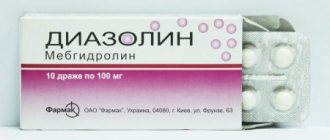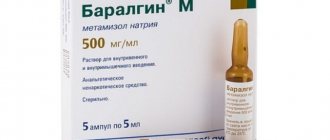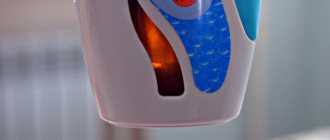Most expectant mothers know very well that they need to avoid taking various medications, especially if they are in the first trimester of pregnancy, when the fetus is especially vulnerable. And many women consider taking “herbs” to be a harmless method of treatment. And completely in vain! Many herbal medicine products are contraindicated for pregnant women. Let's figure out whether breastfeeding 4 can be used during pregnancy.
Nowadays, many people try to be treated with traditional medicine, believing that herbs are no less effective than drugs. Of course, serious illnesses cannot be treated without medications, but a common cold can be cured with herbs. But is it dangerous to use herbal decoctions during pregnancy?
Herbs during pregnancy
Many pregnant women prefer to avoid taking pharmacological cough medications for fear of harming their unborn baby. In this case, alternative medicine will come to the rescue. One of the effective remedies that is safe during pregnancy is breast milk, available on the market in various versions .
Breast preparations have a different composition, are more harmless to the body than medications, and do not affect the function of other internal systems. Despite this, pregnant women should drink cough syrup only on the advice of a specialist.
The effect of all plant mixtures is approximately the same, and is aimed at:
- dilution and removal of mucus from the bronchopulmonary tract;
- relieving the inflammatory process;
- stimulation of coughing;
- preventing the proliferation of pathogenic microorganisms.
The products can be purchased in pharmacy chains in bulk or in filter bags from which decoctions or infusions are prepared.
Description of the product
To treat cough, many people buy chest herbal tea. In the pharmacy you can find four versions of this remedy. We will consider the properties of the collection, which is usually designated as number 4. This product is sold in the form of a loose collection, packaged in cardboard packs or in filter bags.
Advice! Herbal infusions packaged in filter bags are certainly more convenient, as they are very easy to brew. But they are less effective and efficient than fees that are sold in bulk. This is due to the manufacturing technology.
Options for breastfeeding differ in composition. The drug, designated number four, includes:
- Ledum (shoots). This plant has an expectorant effect and contains a large amount of tannins.
- Chamomile (flowers). The plant is widely known for its anti-inflammatory properties.
- Calendula (flowers). The substances contained in the flowers of the plant have pronounced antibacterial and anti-inflammatory properties.
- Violet (herb). The addition of this plant to the collection is due to its anti-inflammatory and sedative effects.
- Licorice (roots). This is one of the most effective plants used to treat cough.
- Mint (leaves). The refreshing and soothing properties of mint are well known.
In what cases will it be useful?
Breast collection No. 4 is recommended for use for:
- ARVI accompanied by cough;
- inflammatory diseases of the nasopharynx;
- bronchial asthma (non-allergic origin).
Most women, after reading the composition of the collection, will decide that this composition can be used during pregnancy. However, this is not quite true. The most controversial component of the collection is licorice root.
This plant can have a negative effect on the water-salt balance (provoke the appearance of outflows), as well as on hormonal levels. This cannot but affect the well-being of the woman herself, as well as the development of the unborn child.
Therefore, self-medication using breast collection No. 4 is prohibited. Before drinking the infusion from the collection, you should consult your doctor. Perhaps he will recommend another, safer option.
How to use?
If you purchased the collection in filter bags, then preparing the infusion is simple: you need to put the bag in a glass and fill the glass with boiling water. After twenty minutes of infusion, the infusion can be drunk. It is more difficult to prepare an infusion from loose raw materials, but its effect is more effective. Cooking rules:
- You will need two saucepans to make a water bath: pour water into a large saucepan and put it on the fire, lower a smaller saucepan into hot water, in which the infusion will be prepared;
Advice! To prepare herbal infusions, it is recommended to use enamel dishes; you can also use ceramic or glass dishes.
- pour two tablespoons of breast collection No. 4 into a smaller saucepan, pour in 200 ml of boiling water;
- heat for fifteen minutes, then turn off the heat and continue steeping for 45 minutes;
- strain the liquid, squeeze out the remaining sediment well;
- add boiled water so that the total volume of the infusion is 200 ml;
- Divide the finished product into three servings and drink throughout the day;
- before drinking the next portion, the infusion must be heated so that it is warm;
- the course of treatment should not take more than three weeks;
- It is allowed to store the finished infusion in the refrigerator for no more than 48 hours.
Contraindications
A woman’s body can behave unpredictably while carrying a child, and the components included in breast milk can provoke an allergic reaction.
Any ingredient in the herbal mixture can become a powerful allergen for a pregnant woman, even if she has not previously experienced negative reactions to the herb.
Some plants contain special substances that cause contraction of the smooth muscles of the respiratory system, which promotes better mucus discharge.
Likewise, these components can affect the uterus and cause premature labor or miscarriage. Many plants individually may not have an adverse effect on a pregnant woman, however, in combination with other herbs, they can be harmful and provoke severe allergic reactions.
Therefore, before use, you should study the contents of all herbal remedies and find out whether the plants they contain are potentially allergenic.
The most common side effects after herbal medicine include itching and rashes on the skin, allergic runny nose, and swelling.
Contraindications and possible side effects
The instructions for breast collection 4 do not indicate any contraindications for pregnant women. This is due to natural ingredients and their low concentration, but it is impossible to predict how they will affect the body of a particular woman. Therefore, the decoction cannot be used without a doctor’s prescription.
The drug is prohibited for women during pregnancy if there is sensitivity to one of the components. The only contraindication is the presence of allergies. It is worth remembering that it can occur due to a change in a woman’s condition, so the infusion should be taken with caution, even in the absence of contraindications.
No side effects were found when taking the drugs. Possible consequences of taking:
- Licorice has a weak diuretic effect. If consumed in excess, it causes increased urination, which leads to changes in electrolyte balance.
- The essential oils contained in herbs can cause heartburn or stomach discomfort, especially if you drink the decoction frequently and on an empty stomach.
Herbal collection No. 1
Breastfeeding 1 during pregnancy can be an excellent alternative to medications.
Prescribed for cough with acute respiratory infections, pneumonia, bronchitis, tracheobronchitis and other inflammations of the pulmonary tract. It has a slight sedative effect, improves mucus removal, promotes expectoration, and eliminates inflammation. Includes:
- marshmallow root. Helps soften inflamed mucous membranes of the throat, stimulates expectoration;
- coltsfoot. Disinfects mucous membranes, activates mucus discharge, protects the pharynx from irritation;
- oregano is a unique substance rich in microelements and essential oils. An excellent natural antiseptic that inhibits the proliferation of microbes.
The most dangerous component is oregano, which can cause bleeding in the early stages of pregnancy, so this herbal remedy is not prescribed in the 1st trimester.
Another contraindication is if the mother is allergic to one or more ingredients.
How and what to treat cough during pregnancy
The causes of cough in pregnant women are no different from those of other people. However, during pregnancy, a woman’s immunity decreases, so she is more susceptible to colds and viral diseases.
The most common causes of cough are:
- ARVI;
- flu;
- allergic reactions;
- digestive problems (reflux, that is, the contents of the stomach enter the esophagus. This causes heartburn, which provokes a cough);
- bronchitis;
- tonsillitis;
- pneumonia;
- smoking and its consequences;
- bronchial asthma;
- heart and nervous diseases.
Types of cough
There are dry and productive coughs:
- In the first case, sputum does not come out; it is usually a symptom of acute respiratory infections, acute respiratory viral infections and other diseases of the upper respiratory tract. A non-productive, dry cough must be soothed as it can be debilitating for the patient.
- In the second type, the cough produces sputum - a natural defense mechanism that does not need to be suppressed if it is not too strong. For productive coughs, expectorants are taken to facilitate sputum production.
Different types of cough are treated differently, and the methods used in some cases may be harmful in others. In any case, a doctor should prescribe treatment after conducting an appropriate examination.
Treatment of cough during pregnancy
Self-medication during pregnancy is dangerous! Uncontrolled use of medications, especially without reading the instructions, can harm both the expectant mother and the child.
Many pregnant women begin to self-treat with traditional methods, believing that they are safer than “chemistry”.
In fact, many herbal preparations are contraindicated in pregnant women: some of them have an abortifacient effect or can cause severe developmental disorders in the child.
You should also not take medications intended for small children - many women believe that they are safe. Indeed, some medications are suitable even for infants, but can be dangerous for the fetus. Therefore, before taking any medications, you should consult a doctor.
Coughing in pregnant women should not be ignored, as it is a symptom of the disease. It is necessary to treat the cause of the cough, because any infection and inflammation negatively affects the development of the fetus. You need to be treated under the supervision of a general practitioner and gynecologist, and, if necessary, other specialists.
How to treat cough during pregnancy in the 1st trimester
The first trimester is the most crucial time: during this period, both the causes of the cough and improper treatment are dangerous. It is now that the most important systems of the fetus are being formed, so any illness of the expectant mother or taking medications contraindicated during pregnancy can lead to serious malformations of the fetus.
Therefore, if a cough occurs, you should consult a doctor and find out the cause. In the first trimester, they try to prescribe the most gentle treatment methods and use medications to a minimum: individual intolerance to even the safest drugs cannot be ruled out.
Mucaltin and marshmallow root syrup are used without restrictions for cough during pregnancy. These medicines are of herbal origin, have an expectorant effect, and are used for dry cough.
Bronchicum, Stodal, Sinekod are also used for its treatment in the first trimester. For coughs with sputum, Doctor Theiss, Bromhexine, Mucaltin, Bronchiprest, Herbion, Tussin, Gedelix, Doctor Mom, Linkas, Prospan, Theraflu are recommended.
All medications can be started to be used only after consulting a doctor!
It is worth noting that cough drops, which are freely available in pharmacies and stores, only relieve symptoms for a short time and have virtually no therapeutic effect. They contain dyes and flavors, and most importantly, a large amount of sugar. Therefore, you should not try to cure a cough with their help.
Treatment of cough in the 2nd trimester of pregnancy
In the 2nd trimester of pregnancy, all the main systems of the fetus have already formed, so there are fewer restrictions on taking medications, but they still exist. The causes of cough can be dangerous for the fetus, especially if complications such as bronchitis and pneumonia occur. You should also be treated under the supervision of a doctor.
For dry cough in the second trimester, you can use Stoptussin syrup, Coldrex Knight, Falimint, Libexin, Mucaltin, marshmallow root syrup, Eucabal, Stodal.
To treat wet cough during pregnancy in the 2nd trimester, the following drugs can be prescribed: Stodal, Bronchicum, Broncho-Gran.
Despite the fact that at this stage the placenta has already formed to protect the fetus, the baby can still suffer as a result of the illness of the expectant mother or improper treatment. Dangers that threaten the fetus as a result of maternal illness in the second trimester of pregnancy are disorders of the development of the endocrine system, bone tissue, nervous system, and fetoplacental insufficiency.
Treatment of cough in the 3rd trimester of pregnancy
At this stage, coughing in pregnant women can cause premature or complicated labor as a result of pressure on the uterus. Placental abruption, rupture of amniotic fluid and, in the presence of infection, its entry into the fetal fluid are also possible. An illness that caused cough in the last trimester can affect lactation in the future.
As a preventative measure, in the last trimester of pregnancy it is advisable to spend less time in crowded places so as not to catch some kind of infection.
Treatment of dry cough in the 3rd trimester is carried out with the following drugs: Mucaltin, marshmallow root syrup, Eucabal, Stodal
For the treatment of wet cough in the 3rd trimester, the following drugs can be prescribed: Stodal, Bronchicum, Broncho-Gran.
What are the dangers of coughing during pregnancy?
A severe and frequent cough during pregnancy poses a direct threat. Due to the cough reflex, the pressure in the abdominal cavity increases, as well as blood pressure, and the blood supply to the uterus is disrupted. Particularly dangerous is a debilitating dry cough that is difficult to stop.
Frequent coughing attacks can cause premature birth, miscarriage, or pregnancy complications, such as:
- uterine bleeding;
- fetal hypoxia;
- increased uterine tone;
- placental abruption.
In addition, coughing can aggravate toxicosis, causing nausea and vomiting. In each trimester of pregnancy, cough has its own negative consequences and its own treatment characteristics.
Source: https://kgkb6.ru/kashel/kak-i-chem-lechit-kashel-pri-beremennosti.html
Chest collection No. 2
The active components of this composition are:
- plantain;
- coltsfoot;
- licorice.
Indications for prescribing the herbal remedy are inflammatory processes in the lungs and bronchi, as well as other diseases of the ENT organs, accompanied by difficult-to-discharge mucus.
Breast collection 2 during pregnancy has a beneficial effect on the condition of the bronchopulmonary tract, will help remove stagnant mucus, and relieve inflammation. Can be used for both dry and productive coughs.
Plantain enhances the secretion of sputum, thins the viscosity of stagnant secretions, and stimulates its elimination during coughing.
Despite the properties of licorice to have an expectorant and enveloping effect, its use is not recommended for those women who have a tendency to develop edema.
Licorice, contained in breast formulations No. 2 and 3, has the properties of retaining fluid in the body, which is contraindicated in the treatment of pregnant women.
Herbal mixture No. 2 is allowed for use in the 2nd and 3rd trimester of pregnancy on the recommendation of the attending physician.
Benefits of herbal remedies
Herbal medicines are considered harmless medicine. They consist exclusively of herbs. To overcome cough, special preparations are used. They are a combination of several herbal components that are effective for bronchopulmonary diseases, acute respiratory viral infections, and influenza. Collections are used to treat acute and chronic forms of diseases.
The main advantage of herbal medicines over pharmacological forms is their naturalness. The preparations consist exclusively of natural ingredients, which means they have a gentle effect on the body. The combination of herbs is inexpensive, unlike industrially produced mucolytic products. The preparations are easy to use: at the pharmacy you can purchase them in packaged form (like tea bags) or as raw materials for brewing.
Phytocollection No. 3
Mixture No. 3 is used for diseases of the nasopharynx, as well as to eliminate productive cough.
Relieves inflammation, stimulates coughing, has general tonic and disinfectant properties. Used as an expectorant. The third fee includes:
- pine buds;
- anise;
- sage;
- licorice;
- marshmallow
Pine buds have mucolytic properties and inhibit inflammation.
Anise seeds are an excellent cough suppressant that eliminates inflammation in the respiratory tract. However, at an early stage of pregnancy, this component is prohibited: it can lead to uterine bleeding.
Marshmallow reduces the viscosity of sputum, stimulates expectoration, and is intended to eliminate diseases of the respiratory organs. However, in the early stages of pregnancy it can also cause harm.
This breast herbal mixture is prescribed taking into account the individual condition of the woman, preferably from the 2nd trimester.
Instructions for preparing the decoction
To treat cough in pregnant women, doctors often prescribe a chest mixture, which in the form of a decoction (tea) is safe and effective for inflammation of the respiratory tract.
Self-medication is contraindicated. There are 4 types of medicinal mixtures, which differ in plant composition. In the absence of a tendency to edema, pregnant women are allowed to take breastfeeding formulas 2 and 4. Herbal formulations 1 and 3 are contraindicated during pregnancy. Medicinal compositions 2, 4 are prescribed according to indications when the health benefits to the pregnant woman are higher than the potential threat to the intrauterine development of the fetus.
Collection 2
In the absence of a tendency to edema, herbal compositions are not contraindicated during pregnancy. Medicinal properties of active ingredients:
- coltsfoot contains inulin, essential oil, glycoside (tussilyagin), mucous and tannins, coats the mucous membrane of the sore throat, strengthens the immune system, reduces hoarseness;
- licorice root contains flavonoids, licurazide, glycyrrhizic acid, is effective for dry coughs, promotes the formation of viscous sputum with its further removal from the respiratory tract;
- large plantain with polysaccharides, carotene, tannins, glycosides (rinanthin), vitamin C in its natural composition suppresses the inflammatory process, strengthens the immune system weakened by pregnancy.
Collection 4
This combined drug, when administered orally, provides a pronounced antispasmodic, expectorant, and anti-inflammatory effect. Breast collection 4 is approved for women during pregnancy for the symptomatic treatment of acute respiratory viral infections, influenza, etc. The therapeutic effect is provided by plant components:
- wild rosemary shoots contain arbutin, tannins, palustrol, and provide an expectorant effect;
- licorice rhizomes with flavonoids, lycurazides, and glycyrrhizic acid in the composition promote the formation of viscous sputum and facilitate the process of coughing;
- chamomile flowers with anthemisic acid, essential oil, azulene, glycosides have an anti-inflammatory effect;
- Calendula contains flavonoids, tannins, carotenoids, and saponins that are beneficial for the body of a pregnant woman;
- violet grass contains vitamin C, glycosides, saponins, flavonoids (rutin, quercetin), which provide a sedative and anti-inflammatory effect, strengthen local immunity;
- mint leaves with menthol in essential oil provide a moderate sedative effect.
In the 1st trimester of pregnancy, it is advisable to abandon any medications and give preference to traditional treatment methods. After consulting with your doctor in advance, you are allowed to take only a fresh portion of breast milk 2 or 4 (do not store in the refrigerator for more than 2 days). Recommendations regarding other obstetric stages of pregnancy:
- Treatment of cough in women in the second trimester is carried out similarly to the recommendations of the 1st trimester.
- In the third trimester, be careful, since mint in collection 4 can trigger premature labor.
- It is forbidden to use several drugs at once to remove mucus from the respiratory tract.
The recommended course of treatment for cough varies from 2 to 3 weeks (in the absence of side effects and deterioration from the fetus). If there are no contraindications, the rules for preparing and using the medicine are presented below:
- 1 tbsp. l. mixture of herbs pour 1 tbsp. boiled cold water.
- Bring the mixture to a boil, simmer over low heat for another 15 minutes.
- Set aside from heat and leave covered for 45 minutes.
- Cool, be sure to strain before using (do not drink too hot), and shake.
- Add boiled water so that the resulting volume corresponds to a full glass.
- Take the prepared composition orally before meals 4 times a day for 3 weeks.
- The recommended dosage is 50–75 g (one-third of a glass) of liquid at a time. The maximum daily dose is 2 glasses of medication.
Regardless of what trimester it is, the principles of taking breastfeeding do not differ significantly from the usual recommendations. The official instructions do not provide a separate paragraph dedicated to the use of the drug during pregnancy. The dosage and duration of treatment are determined by the doctor individually.
In 1st trimester
The process of fetal organ formation can be influenced by factors that were previously considered insignificant. The first trimester requires especially strict adherence to instructions.
Rules of application:
- The collection cannot be used together with drugs that suppress the cough reflex. This interferes with the discharge of sputum and leads to its stagnation.
- Concomitant use with drugs that have a similar mucolytic effect is not recommended. Excessive thinning of mucus makes it difficult to cough up.
- If breastfeeding 4 is prescribed during pregnancy, in the 1st and subsequent trimesters when using it, you must follow medical recommendations. Self-adjustment of the dose towards an increase can lead to undesirable reactions. At the same time, an unreasonable reduction in the amount of collection taken (for example, due to a feeling of fear for the unborn child) will lead to the ineffectiveness of the prescribed treatment.
- The resulting infusion should not be left for storage for more than 2 days. This is due to the fact that on the 3rd day the medicinal properties of the drug begin to be lost.
- The frequency of administration should not exceed 3 times a day. One dose of breast collection 4, as a rule, is a third or half a glass. Shake before use.
In the 2nd trimester
The rules of use and precautions are identical to those described above. If breastfeeding 4 is prescribed during pregnancy, in the 2nd trimester, despite the completion of the organ laying process, the instructions cannot be ignored.
In the 3rd trimester
During this period, there is a gradual process of preparing the woman’s body for the birth of the unborn child. The main task is to prevent premature birth. If the attending physician sees a threat in the drug in the form of increased uterine tone (due to the mint it contains), you should listen to his advice. You need to drink breast milk 4 with caution during pregnancy: the 3rd trimester is the time when the fetus is more vulnerable than ever.
There are 4 types of fees, each of them consists of different ingredients:
- No. 1 consists of coltsfoot herb, marshmallow root, oregano;
- No. 2 - leaves of coltsfoot, plantain, licorice root; thanks to these herbs, its composition includes polysaccharides, carotene, tannins, vitamin C, essential oils, glycyrrhizic acids, etc.;
- No. 3 contains pine buds, which disinfect and relieve inflammatory processes, anise, sage, marshmallow;
- No. 4 contains such components as wild rosemary shoots, chamomile flower, calendula flower, violet herbs, licorice root, mint leaves.
Slow but effective effects of herbs
The method of application and dosage are the same for everyone. Breast preparation for cough during pregnancy is taken in the form of a decoction.
- In order to prepare decoction No. 1, 2, a pregnant woman needs to take a tablespoon of herbs and add 200 ml of water (it should be cold).
- Boil over low heat for at least 15 minutes.
- Let the broth brew for 45 minutes.
- Before use, strain the resulting infusion and shake.
- Add boiled water so that the volume is equal to a glass.
- Drink every time before meals (up to 4 times), in general no more than 2 glasses.
- Take two tablespoons of herbs and pour boiling water over them.
- Leave for at least 20 minutes.
- Strain and shake before use.
- Drink 1/3 cup hot before meals.
The course lasts from 2 to 3 weeks. Breast collection 4 should be taken with extreme caution during pregnancy.
The first recipe is contraindicated during pregnancy, as it contains oregano. It can cause:
- uterine bleeding;
- hypersensitivity;
- tendency to allergic reactions;
- hay fever
It may also cause side effects such as:
- edema;
- severe itching;
- skin rashes;
- hives;
- allergic rhinitis and other reactions.
Contraindications for using the second collection include hypersensitivity to the ingredients. Medicinal herbs include licorice roots (it retains fluid in the body), so it is not recommended to decide whether breastfeeding can be taken during pregnancy without consulting a specialist. Side effects can be in the form of allergies - itching, rashes, swelling. This infusion can be stored for no more than two days, and only in a cool place.
Contraindications for other preparations are the same - if you are hypersensitive to medicinal herbs, you should not take tinctures without special instructions. Otherwise, they may cause an allergic reaction in the body. Recipe 4 is considered especially dangerous in case of overdose, since it contains a poisonous plant - wild rosemary.
Should be used only after consultation with a specialist
There are no contraindications as such if the specialist is satisfied with the woman’s condition during pregnancy. If you follow all the recommendations, there will be no negative consequences. You can drink the breast milk starting from the 2nd trimester.
During pregnancy, many women prefer to give up their usual treatment medications so as not to harm the unborn baby. They use traditional medicine, one of which is breast milk. It consists entirely of natural substances and is made by hand.
An option such as a tincture of medicinal herbs is an indispensable remedy for removing phlegm from the body. It has anti-inflammatory, thinning properties. It is often used to treat the lower and upper respiratory tract. For those who are not good with herbs, there are ready-made herbal preparations that are excellent in treating the bronchi and lungs.
There are 4 types of cough herbs in total. They all differ in composition, but each of them helps during chronic or acute bronchitis, laryngitis and other similar diseases. All chest packs are unique in their own way and work differently. You need to know which one you can drink during pregnancy.
These drugs act more slowly, unlike pharmacological drugs, but they are safe for the expectant mother, for the health, and the condition of the baby as a whole. But, nevertheless, they must be taken on the recommendation of specialists, because each body reacts differently.
| Herbal combinations | Indications for use |
| № 1 | Used for symptomatic treatment during acute respiratory viral infections, influenza, infectious and inflammatory processes of the respiratory tract, pneumonia, bronchitis, tracheitis, tracheobronchitis. Has an expectorant, anti-inflammatory, sedative effect. |
| № 2 | Indications: ARVI, influenza, pneumonia, tracheitis, bronchitis and other respiratory diseases in which sputum is poorly separated. Just like the first breast collection, it has an expectorant and anti-inflammatory effect. You can drink during pregnancy only after the 1st trimester. |
| № 3 | Suitable for the treatment of acute respiratory viral infections and influenza. It helps a lot when it is necessary to cure an infectious and inflammatory disease of the nasopharynx (pneumonia, tracheitis, etc.). The substances included in its composition have a disinfectant effect and can relieve inflammation. Can be used as an expectorant. |
| № 4 | Can be used for bronchial asthma that is not caused by allergic or seasonal exacerbation, ARVI and other diseases. It is believed that this particular combination of plants is more suitable than others during pregnancy. But it contains licorice, and it can be dangerous, as it affects the well-being of the pregnant woman and, accordingly, the fetus. Therefore, you can drink breast milk only after consultation with specialists during pregnancy. |
Collection 4
- Great plantain contains polysaccharides, carotene, tannins, glycoside (rinanthin), vitamin C
- Coltsfoot - contains inulin, essential oil, glycoside (tussilyagin), mucous and tannins
- Licorice roots - contain flavonoids, licurazide, glycyrrhizic acid
- Pine buds have a disinfectant effect and relieve inflammation
- Anise - also has disinfectant and expectorant properties
- Sage has an anti-inflammatory effect.
- Marshmallow – has an expectorant, anti-inflammatory effect
Collection 4
Collection No. 4
It is prescribed more often than other herbal remedies during pregnancy, as it has the most successful combination of ingredients. Can be used for bronchial asthma not provoked by allergic reactions. Helps reduce pain when coughing, stimulates the removal of mucus, easily removing it from the respiratory tract.
The contents of herbal mixture No. 4 include:
- violet. An expectorant that thins mucus. Has diuretic properties, eliminates inflammatory processes in the pharynx;
- chamomile is a natural antispasmodic with anti-inflammatory, diaphoretic, and antiseptic properties;
- calendula. Perfectly relieves inflammation, disinfects mucous membranes, reduces spasms;
- mint. A natural pain reliever that helps relieve nervousness and nausea;
- wild rosemary Activates the removal of mucus, softens coughing attacks;
- licorice. Eliminates congestion in the lungs, improves coughing.
Potentially dangerous for pregnant women are wild rosemary, mint and licorice.
Ledum is a toxic substance that can cause an unexpected reaction in expectant mothers, especially during an overdose.
Licorice can cause a sharp deterioration in health and also have a negative effect on the fetus.
A side effect of using mint can be uterine hypertonicity and premature birth.
Herbal collection No. 4 is not recommended for use in the early stages of pregnancy. It can be prescribed if the woman is not allergic to the components.
Application 4 fees
Of all the fees, the fourth one is considered the safest for expectant mothers. However, it can only be treated with the permission of a doctor. As in the third collection, the fourth contains licorice root, which retains liquid. However, the percentage of this component here is relatively small, so the doctor may approve the herbal medicine if the expectant mother is not sensitive to the plants in the composition.
Focusing on the trimester
When using the 4th collection, it is important to take into account the gestational age. The safest period for herbal medicine is the 2nd trimester. But even in the middle of pregnancy, any health-related actions should be discussed with your doctor. Trimester features of collecting collection look like this:
- In the first. When a woman manages to become pregnant, she must take special care in the first three months. At the beginning of gestation, it is strictly forbidden to self-medicate. Only a specialist can objectively assess the risks of taking a herbal medicine during the period of baby formation. Most doctors advise against using alternative cold treatments before the 14th week. Active medicinal herbs can negatively affect the development of the fetus and affect the process of organ formation.
- In the second. The middle of the period is the optimal time to use the herbal medicine. The baby’s organs are already formed, which means that treatment with the collection will not affect this process. Before taking herbs, you need medical consultation: the expectant mother may have contraindications to taking herbal medicine in the 2nd trimester. It is important not to overdo the amount you drink: an overdose can lead to undesirable consequences.
- In third. Herbal therapy for bronchopulmonary diseases in the later stages is possible only with the permission of the gynecologist. However, doctors more often look for alternative treatment options than allow the use of breastfeeding during pregnancy in the 3rd trimester. It contains mint. It can provoke uterine hypertonicity, as a result of which labor will begin earlier than expected. Premature babies are very vulnerable. They have health problems. There is a risk that the baby will die if born prematurely.
Rules of application
In order for the 4th breast collection to be exclusively beneficial, it must be used correctly. A pregnant woman should adhere to the following recommendations:
- Obtain a doctor's permission to use herbal medicine. Self-medication is strictly prohibited. Especially in the first gestational months and at the end of pregnancy. “Amateur activity” can lead to negative consequences. The expectant mother should know for sure that there are no contraindications to the use of herbs.
- Study the composition. This is especially important if you are allergic to herbal ingredients. If you see an allergen among the ingredients, you should stop taking the herbal medicine.
- Do not combine with drugs that remove phlegm and block cough. The means can “conflict” with each other and neutralize each other’s effects. This can provoke an increase in the inflammatory process.
- Do not exceed the dose. You should consult your doctor about the permissible daily amount of collection. This volume should not be exceeded: the concentration of phytocomponents can cause complications.
- React to body signals. If alarming symptoms appear and the expectant mother feels discomfort, she should immediately stop herbal treatment and consult a specialist of her choice.
Brewing instructions
The collection must be brewed correctly. Many people prefer products in filter bags. Making medicine in this case is very simple. The bagged collection is brewed like tea. Place the bag in a mug and pour boiling water over it. You need to cover the cup, wait 15 minutes - and the medicine is ready. To prepare an infusion for a day, you need to take two bags, pour about one hundred ml of boiling water, and close the container. After a quarter of an hour, squeeze out the bags, take them out, and add the medicine with liquid (boiled) to a volume of 100 ml. This infusion should be taken half a glass. The daily number of doses is three.
If there are no contraindications, you can add ginger
Although filter bags impress with their convenience, experts recommend purchasing phyto-collections in the form of crumbly raw materials. Then you can get a truly effective medicine. Expectant mothers should not use packaged herbal formulations also because it is impossible to evaluate the contents of the bag. Unscrupulous producers can replace one plant with another, which is fraught with negative consequences.
It is more difficult to brew the collection in the form of crumbly raw materials than the packaged one, but not by much. You need to prepare an enamel bowl, put two tablespoons of the composition there. The raw materials are poured with boiling water (about a glass). The vessel is covered with a lid. The medicine is brewed for a quarter of an hour in a special way - in a water bath. Then leave it covered for about 45 minutes. Then it is filtered to remove the brewed raw materials. Add cooled boiled water to the infusion: the end result should be approximately 200 ml. The volume is divided into 3 servings. This is the daily requirement according to the instructions. But if the doctor prescribed a different dose (smaller), then you should listen to his recommendations.
How to drink
The collection should be consumed before meals. The liquid is pre-shaken and slightly heated. The decoction prepared from the breast collection can be stored in the refrigerator for two days. After this, it loses all its properties: the medicine will be completely useless in the treatment of ailments accompanied by cough.
The course of treatment with fees should not exceed three weeks. Expectant mothers often have their course reduced. These nuances must be clarified with a specialist observing the pregnancy. By exceeding the daily norm or prolonging herbal medicine on her own, a pregnant woman can, without knowing it, harm the baby. Therefore, it is so important to act according to the instructions, and first obtain the advice of a specialist.
Instructions for use
Before use, you must carefully study the instructions.
All herbal infusions act more slowly than medications, so they should be used for a long time. Having a cumulative effect, plants are able to alleviate the condition after 3-5 days. The product in bags must be brewed with boiling water, wait 10-15 minutes, and then consumed instead of regular tea on an empty stomach.
If the herbs are purchased in bulk, 20 g of raw materials are poured with 200 g of boiling water. The resulting mixture is put on fire, brought to a boil, left for 20 minutes and strained.
The healing drink should be consumed twice a day. You should not take the product before bed: by provoking expectoration, it can disrupt normal sleep.
Expectant mothers should use herbal medicine with caution at any stage of pregnancy: despite the natural composition, the products can be harmful. Therefore, the patient must carefully monitor the body’s reaction, and in case of any deviations, consult a doctor.
Methods for preparing the collection
Place two tablespoons of the drug in an enamel container and pour a glass of hot boiled water. Close the lid and place in a water bath for 15 minutes. Leave for 45 minutes at room temperature. Clear the infusion of plant materials by straining. Add enough boiled water to the remaining solution so that you end up with 200 ml of the drug. Use throughout the day, divided into 3 doses.
If the collection is packaged in filter bags, it is easier to prepare. You need to place 2 bags in an enamel or glass container, pour 100 ml of boiling water and close the lid for 15 minutes. Then add water to 100 ml. Take half a glass 3 times a day.
Knowledge of the mechanisms of action of some herbal components included in the drug debunks the myth about the absolute safety of herbal medicine. No medicine should be used without prior approval from your doctor.
Author: Kristina Mishchenko, doctor, especially for Mama66.ru
